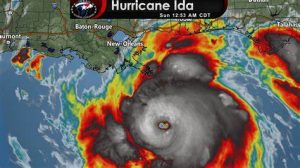Discuss Risk Management with your Fuel Distributor before a Big Storm Hits
With over 1 million homes and businesses without power this week, we find ourselves with memories of the past, specifically a memory from back in 2017.
This week Hurricane Ida hit the gulf coast as a Category 4 Storm with winds of over 150 MPH. While Ida has not yet reached the extent of damage caused in 2017 by Hurricane Harvey, we still remember the similarities.
After 2017’s Hurricane Harvey battered Gulf Coast refineries and pipelines, tight fuel availability and soaring prices rippled across the nation.
The businesses that best weathered the ensuing weeks of constrained fuel supplies had arranged “insurance policies” in advance. Fuel consumers who, for example, worked with the supply experts at Guttman Energy before the storm’s landfall were better positioned to:
• Depend on the reliability of their fuel-supply contracts
• Assess probable impacts
• Weigh short and long-term risks
• Selectively lock in prices.

Challenge
In 2017 hurricane season was one of the most devastating in U.S. history, severely disrupting energy, logistics, and other sectors. At one point, Hurricane Harvey shut in about 30 percent of the nation’s refining capacity. The ripple effect of the hurricane stretched from Texas all the way up to New York Harbor. Flooding idled refineries, while shut-in pumps preventing refined products from being shipped through pipelines. Fuel shortages and price increases lingered well into October.
In the summer of 2017, what could have been done to cushion the hurricane’s impact on fuel-dependent business sectors?
Insights
“Hurricane warnings always put the Gulf Coast cash market on alert, along with the East Coast fueling-rack cities that may feel the storm’s impact. When forecasts zero in on Houston, prices skyrocket. But market intelligence gives us the flexibility to make the best of prevailing conditions,” representative from Guttman Energy’s Fuels Division.
“As meteorologists were plotting Hurricane Harvey’s course, prices showed just a slow uptick. About three days before landfall, they predicted a direct hit on Houston. That forecast set off alarms here at Guttman. I thought, ‘This country’s going to have major problems for the next two, four, maybe six weeks.’ We started to place early-warning calls, offering supply assurance to customers.
“We knew they’d be aware of the storm, but — like anyone else — they’re juggling a lot of day-to-day concerns. And, having seen media hype fail to materialize over the years, they tend to be skeptical. The Guttman team, on the other hand, has followed the industry through a lot of storms. And this one looked bad.”
Solutions
“Early Wednesday, August 23rd, Guttman’s sales team preemptively jumped on the phones and laid out some options. Their message was, ‘There’s a high probability Hurricane Harvey is going to hit Houston. The impact could be devastating to your supply options. We want you to know you can essentially “buy insurance” against prices that will almost certainly soar in the weeks to come.’
In the short run, the market would work to their advantage. But, from our standpoint, helping customers manage risk is baked into the relationship.
Results
By Monday, August 28th, Houston was staggering. Across the eastern U.S., our customers who had opted for two- or three-cent premiums a few days earlier were now at a 10- to 15-cent pricing advantage. By the end of that week, prices had climbed as much as 40 cents a gallon.
“As news came in, it became obvious the markets probably wouldn’t settle down for six or even eight weeks. We continued to monitor the weather, the markets and the producers. And we maintained close contact with the people who depend on us to keep vehicles and generators running.”
“As supplies tightened, we kept up the flow of decision-making information and budget strategies. A growing number of our customers responded, adjusting their budgets to lock in prices. Knowing Guttman Energy would get product to them gave them a lot of comfort.”
“Knowing Guttman Energy would get product to them gave them a lot of comfort.”
Conclusion
The time to talk about risk management is before a crisis. Once an emergency hits, everyone is looking for fuel. It’s chaos. Hurricane Harvey and subsequent storms demonstrated how high the stakes are. But well-timed coordination between Guttman fuel experts and customers made supply assurance possible even in the face of disaster.



